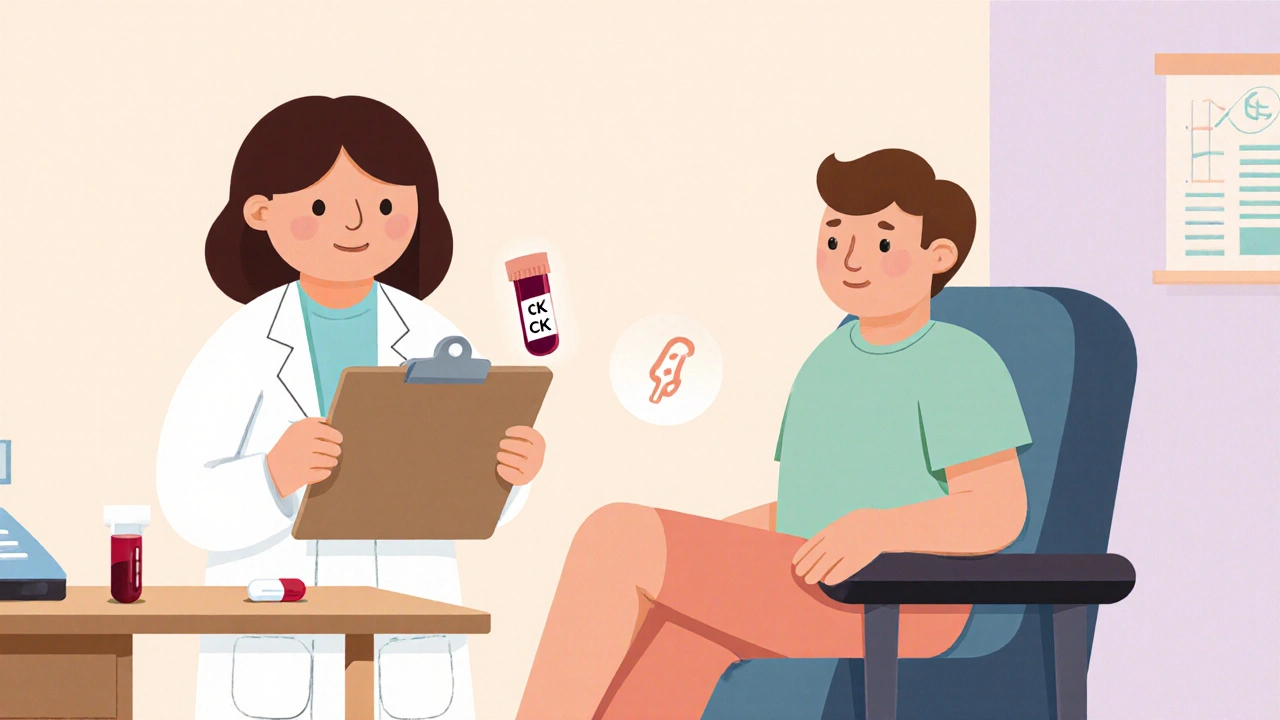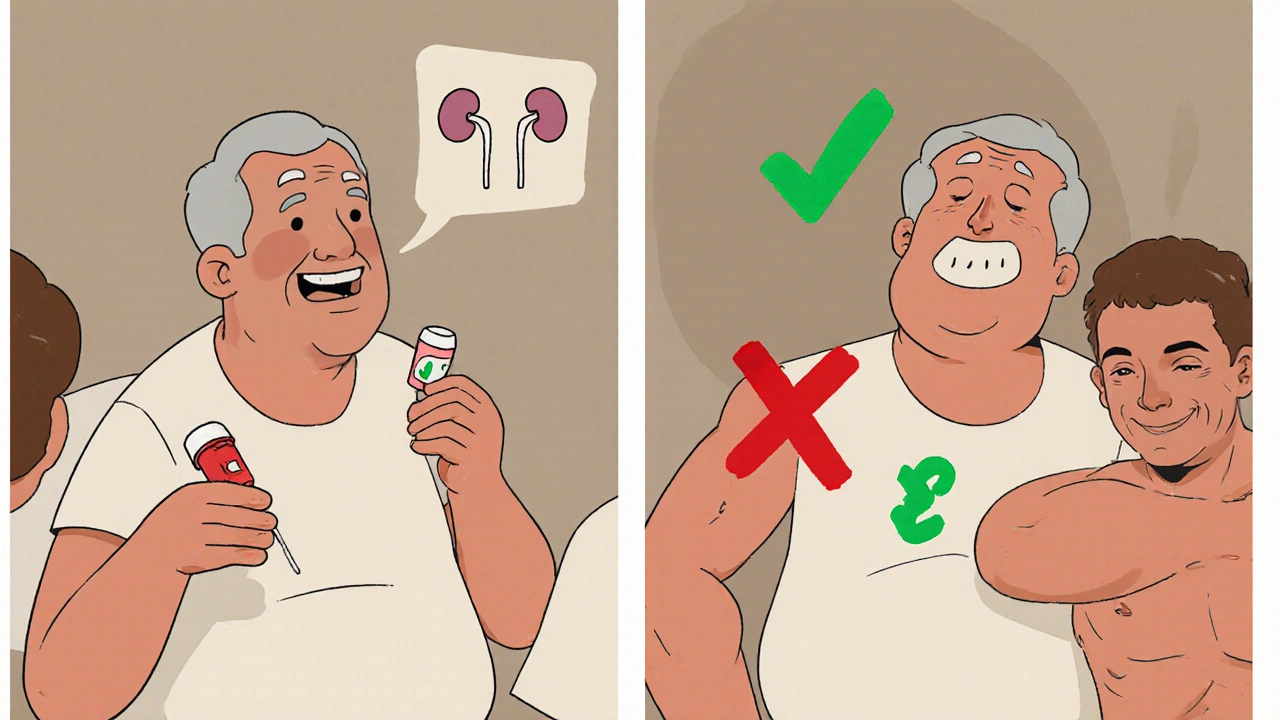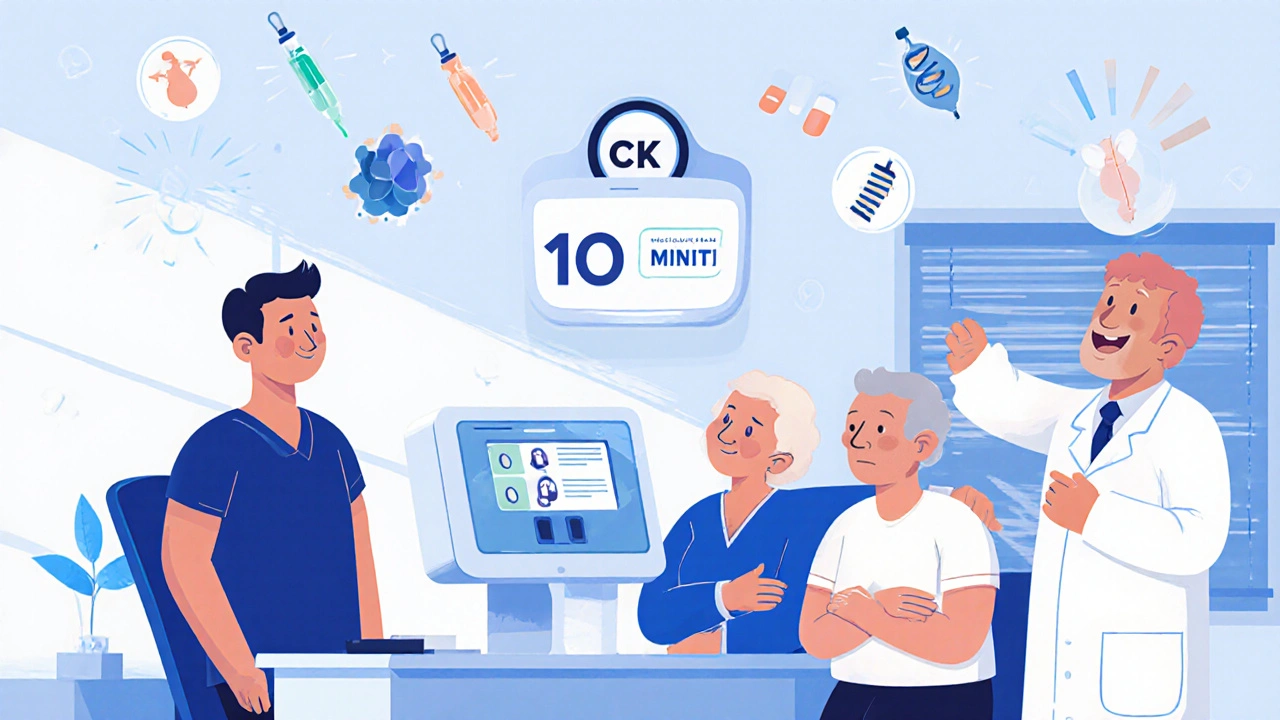When to Get Baseline CK Testing Before Starting Statins
 Oct, 30 2025
Oct, 30 2025
Baseline CK Test Assessment Tool
This tool helps determine if you should get a baseline creatine kinase (CK) test before starting statin therapy. Based on your health profile, it will indicate whether you're in a high-risk category where baseline testing is recommended.
Before starting a statin, many doctors ask: Should you get a baseline creatine kinase (CK) test? The answer isn’t yes or no-it depends on your health, your meds, and your risk. For most people, routine CK testing before statins isn’t needed. But for others, skipping it could mean missing a real problem-or wrongly blaming the statin for symptoms that have nothing to do with it.
Why CK Matters with Statins
Creatine kinase (CK) is an enzyme found in muscle tissue. When muscles get damaged, CK leaks into the blood. High levels can signal muscle injury, including a rare but serious condition called rhabdomyolysis. Statins can cause this-but only in a tiny fraction of users. About 0.1% of people on statins develop CK levels more than 10 times the upper limit of normal. That’s 1 in 1,000. Most people never see any muscle issues at all.Still, muscle pain (myalgia) is common. Around 5-10% of statin users report aches or weakness. The problem? Only about 20% of those cases are actually caused by the statin. The rest? Stress, aging, overexertion, or other meds. That’s why a baseline CK test matters-not to predict side effects, but to help tell what’s really going on later.
When Baseline CK Testing Is Worth It
You don’t need a CK test just because you’re starting a statin. But if any of these apply, it’s a good idea:- You’re over 75 and have kidney issues (eGFR under 60)
- You have hypothyroidism (about 1 in 8 statin users do)
- You’re taking a fibrate (like fenofibrate) along with your statin
- You’ve had muscle pain with statins before
- You’re on high-intensity statins: atorvastatin 40-80 mg or rosuvastatin 20-40 mg
- You’re African American-baseline CK levels are often 50-100% higher naturally
- You’ve recently had a hard workout, injection, or muscle injury
These groups are at higher risk for muscle problems. A baseline CK gives doctors a personal reference point. Without it, a CK level of 400 U/L might look normal on a lab report-but if your usual level is 150, that’s a red flag.
What’s Normal for CK? It Varies
Lab reference ranges say normal CK is 65-110 U/L for women and 145-195 U/L for men. But that’s just a guess. In reality, healthy people can have CK levels that are 300% higher than those numbers and still be perfectly fine.Why? Because CK goes up after:
- Heavy lifting or intense exercise
- Immunizations or intramuscular shots
- Seizures or muscle trauma
- Being sedentary for long periods
Studies show that 25-30% of healthy people have CK levels above the lab’s "normal" range-not because they’re sick, but because their body just makes more. That’s why testing before you start a statin is so important. If you don’t know your baseline, you might think a high CK means the statin is the culprit-when it’s really just you.

Guidelines Don’t Agree-Here’s Why
Different medical groups have different rules:- American Association of Clinical Endocrinologists (AACE): Recommends baseline CK for everyone starting statins (strongest evidence level).
- European Society of Cardiology: Says it’s optional-not required.
- Japan: Requires it for all patients. Why? Higher rates of muscle side effects-12.7% vs. 7.3% in the U.S. and Europe.
- Canada’s RxFiles: Recommends baseline CK only for high-risk groups, and says routine monitoring later is useless.
The biggest disagreement? Whether checking CK changes outcomes. One big study (Cochrane Review, 2016) looked at nearly 48,000 people and found no difference in muscle injury rates between those who got CK tests and those who didn’t. That’s why some experts argue it’s a waste of money.
But here’s the catch: it’s not about preventing injury. It’s about avoiding unnecessary statin stops. When a patient says, "My legs hurt," and their CK is normal, the doctor can confidently say, "This isn’t the statin." That’s worth something.
What Happens If CK Goes Up?
If you start a statin and get muscle pain, your doctor will check your CK again. Here’s how they decide what to do:- CK under 3x ULN: Usually keep taking the statin. Monitor symptoms.
- CK 3-10x ULN with symptoms: Pause the statin, check thyroid and kidney function, consult a specialist.
- CK over 10x ULN: Stop the statin immediately. This is rhabdomyolysis territory.
Important: CK levels alone don’t predict danger. A person with CK at 8x ULN but no pain might be fine. Someone with CK at 2x ULN and severe pain might need action. That’s why symptoms + CK + history = the full picture.
Who Should Definitely Get a Baseline Test
These patients benefit most from baseline CK:- People with kidney disease: eGFR under 60 increases statin buildup. Baseline CK + thyroid test is standard in New Zealand and Canada.
- Those on statin-fibrate combos: This mix raises myopathy risk 6-15 times. CK should be checked every 6 months.
- Patients with prior statin intolerance: If you quit a statin before because of muscle pain, get a baseline now. It helps decide if you can try again.
- Older adults on high-dose statins: Risk of myopathy jumps from 0.05% to 0.3% per year on high-intensity statins. Baseline CK helps track changes.
Also, timing matters. Get the test within 4 weeks before starting the statin. And avoid heavy exercise for 48 hours before the blood draw. A recent workout can spike CK and ruin the baseline.

What to Document
A CK number alone isn’t enough. Good documentation includes:- The exact CK value (not just "normal")
- When you last exercised
- All other meds you take (especially amiodarone, cyclosporine, or fibrates)
- Any recent injuries or injections
These factors explain 68% of CK variability. Without them, even a "high" CK might be misleading.
What’s Changing in 2025
New tools are coming. Genetic tests for SLCO1B1 mutations can predict who’s at higher risk for statin myopathy-especially with simvastatin. About 12% of Europeans have this variant. But these tests aren’t routine yet.Point-of-care CK devices are in late-stage trials. Imagine getting your CK result in the doctor’s office in 10 minutes. That could make baseline testing much more common. Right now, only 64% of patients get tested before starting statins. With faster results, that could jump to 90%.
Meanwhile, the FDA now focuses on how patients feel-not just CK numbers. If you’re not in pain and your heart risk is high, a slightly elevated CK doesn’t mean you have to stop.
The Bottom Line
Most people don’t need a baseline CK test before starting a statin. But if you’re in a high-risk group, it’s one of the smartest moves you can make. It helps avoid unnecessary statin stops, prevents misdiagnosis, and gives your doctor real data to work with.Don’t let a lab number scare you. Don’t ignore muscle pain, either. The goal isn’t to avoid all CK changes-it’s to know what’s normal for you, so you can stay on the statin if it’s helping your heart-and stop it only when it’s truly needed.
Do I need a baseline CK test if I’m starting a statin for the first time?
Not always. If you’re healthy, under 75, have normal kidney function, and aren’t taking other muscle-affecting drugs, a baseline CK isn’t necessary. But if you have risk factors-like kidney disease, hypothyroidism, or a history of muscle pain with statins-then yes, it’s recommended.
Can a high CK level mean I have muscle damage from statins?
Not necessarily. CK can rise from exercise, injury, or even being inactive. A high CK without symptoms is rarely dangerous. The real concern is when high CK (over 10x ULN) comes with muscle pain, weakness, or dark urine-that’s when you need to stop the statin and get help.
Is baseline CK testing a waste of money?
For low-risk people, yes-it adds cost without improving outcomes. But for high-risk patients, it prevents unnecessary statin discontinuation. One study found that clinics using baseline CK had 22% fewer unnecessary stops, saving about $2,850 per avoided discontinuation in patients with heart disease.
What if my CK is high before I even start the statin?
Don’t panic. Talk to your doctor. High baseline CK could be from recent exercise, supplements, or an undiagnosed condition like hypothyroidism. If your CK is over 5x ULN and you have no symptoms, your doctor might delay the statin to investigate further. But many people with high baseline CK still tolerate statins just fine.
Should I get CK tested after starting the statin?
Only if you develop muscle pain, weakness, or dark urine. Routine CK checks after starting statins aren’t recommended by any major guideline. Studies show they don’t prevent serious side effects and only cause unnecessary anxiety and costs.
Lenard Trevino
November 1, 2025 AT 07:34Okay so let me get this straight - you’re telling me that some people naturally have CK levels that are 300% above the lab’s ‘normal’ range and that’s totally fine? Like, my uncle Bob runs marathons, does CrossFit on weekends, and his CK was 900 last year. They told him he had rhabdo. He cried. He quit statins. Turned out he was just a giant muscle beast. I swear, labs are like horoscopes with a degree. We need to stop treating numbers like gospel and start treating people like humans. Also, I got my CK tested before statins because I’m 78 and my kidneys are basically a sieve. Best decision I ever made. Now my doc knows I’m not a ticking time bomb. Just a guy who lifts grocery bags like they’re dumbbells.
Paul Maxben
November 1, 2025 AT 20:17statins are a scam. the pharma companies made up rhabdo so they could sell you more drugs when you panic. my cousin got his ck tested and it was ‘high’ so they took him off statins and now he’s on 7 different meds and still has chest pain. they’re not trying to help you they’re trying to keep you hooked. also i heard the FDA is owned by big pharma. i saw it on a youtube video. and why do they even have reference ranges? who made those numbers? some guy in a lab coat with a calculator and a coffee stain?
Molly Britt
November 2, 2025 AT 14:21Baseline CK? More like baseline paranoia. Next they’ll test your DNA before giving you aspirin. They’re just trying to make you feel sick so you’ll keep taking pills. I’m not getting tested. I’m not a lab rat.
Nick Cd
November 4, 2025 AT 06:00So let me get this straight you want me to get a blood test before taking a statin but you won’t tell me if my CK is high because of the statin or because I did squats last week or because I’m African American or because I’m 75 or because I had a flu shot last Tuesday or because I’m just naturally a muscle monster?? I’m supposed to just trust some lab report that says ‘normal’ but I know that number is a lie because my cousin’s dog had a higher CK than me and he’s dead. Also I think the government is hiding the truth about CK and aliens. I’ve been getting weird dreams about enzymes since 2019. Someone please help me.
Patricia Roberts
November 4, 2025 AT 23:46Oh wow. A 12-page essay on CK levels. And I thought my doctor’s waiting room magazine was boring. Next they’ll publish a 500-page treatise on why you should breathe before taking a pill. Bravo. You’ve turned a simple question into a PhD thesis. I’m just here for the statin and the peace of mind. Not the bloodwork opera.
Adrian Clark
November 6, 2025 AT 18:12Let’s be real - if you’re going to make me take a statin, you should at least give me a trophy for surviving the blood draw. Baseline CK? More like baseline anxiety. I don’t need a number to tell me my legs hurt. I know my body. I’m not a spreadsheet. Also, I’m pretty sure the ‘normal’ range was invented by someone who’s never lifted anything heavier than a coffee mug.
Rob Giuffria
November 8, 2025 AT 12:22Here’s the truth no one wants to admit: we’re all just meat sacks with enzymes. Statins are a band-aid on a bullet wound. The real issue? We’re all dying slowly and the pharmaceutical industry just found a way to monetize the countdown. Baseline CK? It’s not about muscle damage - it’s about control. They want you to believe you’re broken so you’ll keep buying their solutions. And while you’re obsessing over your CK levels, your heart’s still ticking. But hey, at least your lab report says you’re ‘normal.’
Barnabas Lautenschlage
November 10, 2025 AT 02:07I’ve read through this whole thing twice. Honestly, it’s one of the most balanced takes on statin CK testing I’ve seen. The key takeaway isn’t whether you need the test - it’s whether you’re in a group where the test adds meaningful context. For someone young, healthy, no comorbidities, no history of muscle issues? Skip it. For someone with kidney disease, on a fibrate, or with prior statin intolerance? Absolutely get it. The real value isn’t in preventing rhabdo - it’s in preventing the panic and unnecessary discontinuation. I’ve seen patients quit statins because their CK was 400 and they thought they were dying. Turned out they’d just done 100 squats the day before. That’s the real win. Knowledge > fear. And documentation matters. If you’re going to get tested, write down when you last worked out. That’s half the battle.
Ryan Argante
November 10, 2025 AT 09:23While I appreciate the clinical nuance presented here, I must respectfully note that the absence of routine CK testing in low-risk populations is not indicative of negligence, but rather evidence-based prudence. The Cochrane review cited, along with multiple large-scale trials, demonstrates no statistically significant reduction in adverse outcomes with preemptive screening. That said, for high-risk subgroups - particularly those with renal impairment, polypharmacy, or prior statin-associated myopathy - baseline CK assessment constitutes a prudent, low-cost diagnostic safeguard. The goal is not to eliminate all variability in biomarkers, but to contextualize them within individual physiological and behavioral frameworks. In this light, the proposed documentation protocols are not merely administrative - they are clinically indispensable.
Jeanette Case
November 11, 2025 AT 19:13OMG YES. I’m 67, have hypothyroidism, and took a statin once and my legs felt like concrete. I didn’t know why. Now I know it’s probably not the statin - it’s my thyroid. But I didn’t know that until I got my CK done before restarting. I’m so glad I did. Also, I got my test 3 days after yoga, not 48 hours before - oops. My CK was 500. Doctor laughed and said ‘you’re basically a human weightlifter.’ So now I know. Don’t skip the test if you’re in one of those groups. And write down when you last lifted something. I’m gonna print this out and tape it to my fridge. 🙏💪
Leonard Buttons
November 12, 2025 AT 05:58my ck was 800 before statins. doc said 'you're fine' and i started the pill. no issues. turns out i just do a lot of yard work. also i'm black and my dad had high ck too. so yeah. baseline helps. also don't forget to tell your doc if you took creatine. i did. they didn't ask. i should've said something sooner. just sayin'.
Alice Minium
November 14, 2025 AT 05:30so i got my ck tested and it was high. they said it was from my last workout. but i didn't work out. i just walked to the store. i think they're lying. i think the statin is doing something to me. i feel weird. like my muscles are melting. i think they're hiding something. i saw a video about this. they're using ck levels to track us. i'm not taking it. i'm going to try turmeric.
Stephen Maweu
November 15, 2025 AT 11:42Man, I’ve been on statins for 8 years. Never had a problem. But I got my CK tested before starting - just because I lift weights and I’m 70. Best move ever. My doc had a number to compare to when I got some weird soreness last year. Turned out I’d just started hiking again. No statin issue. Saved me from panic, unnecessary tests, and maybe even stopping the pill. Also - if you’re African American? Yeah, your CK is probably higher. That’s not broken. That’s just you. Don’t let a lab sheet scare you. Talk to your doc. Write stuff down. And if you’re not in one of those risk groups? Chill. Statins are helping you. You don’t need a blood test to prove it.